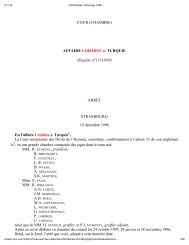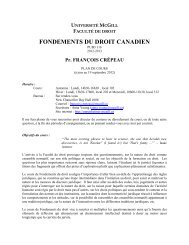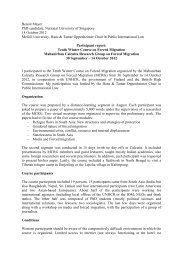Preventive Detention, Suspected Terrorists, and War
Preventive Detention, Suspected Terrorists, and War
Preventive Detention, Suspected Terrorists, and War
Create successful ePaper yourself
Turn your PDF publications into a flip-book with our unique Google optimized e-Paper software.
COLE FINAL<br />
7/1/2009 12:43 AM<br />
708 CALIFORNIA LAW REVIEW [Vol. 97:693<br />
immigration proceedings <strong>and</strong> has been shown to be a danger to the community<br />
or flight risk; 64 (2) is dangerous because of a “harm-threatening mental illness”<br />
that impairs his ability to control his dangerousness; 65 or (3) is an “enemy<br />
alien” or “enemy combatant” in wartime. 66<br />
Three general principles are common to all of the preventive-detention<br />
regimes that the Court has upheld. First, the purpose <strong>and</strong> character of the<br />
detention must not be punitive; punishment requires a criminal trial. This<br />
principle of “nonpunitiveness” assumes that where the government seeks to<br />
address dangerous conduct by depriving individuals of their liberty, criminal<br />
punishment is the first <strong>and</strong> presumptive line of defense. Only where<br />
punishment through the criminal justice system cannot address the problem is<br />
preventive detention warranted.<br />
Second, the detention must be temporally limited. Indefinite detention is<br />
an especially drastic measure, <strong>and</strong> accordingly most preventive-detention<br />
regimes that have been upheld have an articulable endpoint—for example, a<br />
trial, deportation, treatment of a mental disability, or termination of a military<br />
conflict. The endpoint need not be a specific date, but there must be a<br />
conceptual terminating point to the detention. When individuals are detained<br />
pending criminal trial or deportation proceedings, the conclusion of the legal<br />
process marks a clear end to their preventive detention. In a criminal trial, the<br />
defendant will either be acquitted <strong>and</strong> set free, or convicted <strong>and</strong> then<br />
imprisoned for punitive rather than preventive ends. Similarly, a deportation<br />
proceeding will result either in a determination that the individual is not<br />
deportable, in which case she will be freed, or in an order of removal, which<br />
must be executed in a reasonable period of time or the individual must be<br />
released. In civil commitment settings, if the mental illness that is a predicate<br />
for the commitment is successfully treated, or if the individual no longer poses<br />
a danger, he must be released. Finally, prisoners of war must be released when<br />
the necessity created by the military conflict comes to a close, either because<br />
the war ends or because as individuals they no longer pose a threat to return to<br />
battle.<br />
Third, with narrow <strong>and</strong> questionable exceptions, the justification for<br />
detention must be particularized to the individual, <strong>and</strong> generally requires<br />
probable cause of some past wrongdoing as well as proof of some future danger<br />
or risk warranting prevention. Just as the state cannot impose criminal sanctions<br />
64. Id.; see, e.g., United States v. Salerno, 481 U.S. 739, 755 (1987) (finding the Bail<br />
Reform Act constitutional because it authorizes pretrial detention based on danger to the<br />
community <strong>and</strong> acknowledging bail’s traditional use against flight); Carlson v. L<strong>and</strong>on, 342 U.S.<br />
524, 541 (1952) (holding executive could detain violent immigrants pending the outcome of<br />
deportation proceedings).<br />
65. Zadvydas, 533 U.S. at 690; see, e.g., Kansas v. Crane, 534 U.S. 407, 411 (2002);<br />
Kansas v. Hendricks, 521 U.S. 346, 358 (1997).<br />
66. See, e.g., Hamdi v. Rumsfeld, 542 U.S. 507, 518 (2004); Ludecke v. Watkins, 335 U.S.<br />
160 (1948).

















